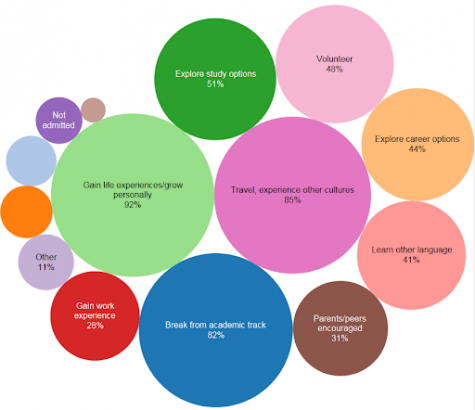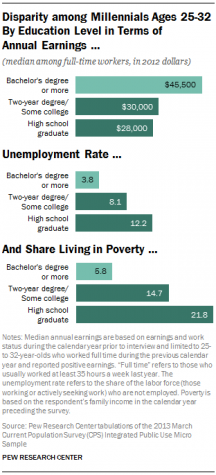College May Not Be for Everyone: Debunking the Myths Surrounding Gap Years and Trade Schools
In recent years, there have been increases in the number of students who are taking a “gap year” between high school graduation and college matriculation and the number of students that are skipping college altogether.
January 4, 2021
After writing our article about the college search and application processes amidst the COVID-19 pandemic, we realized that we were only telling one side of a complicated story. The burden of the debt incurred from student loans, the intensity of four additional years of school, and the fact that college life just is not for everyone have resulted in an increase in the number of students that are taking a “gap year” between high school graduation and college matriculation and the number of students that are skipping college altogether. Of course, the COVID-19 pandemic and the uncertainty it has brought have accelerated this trend.
Many colleges and universities — including Harvard University, New York University, and the Massachusetts Institute of Technology — encourage students to take gap years and allow accepted applicants to defer their admission for a year to do so. In collaboration with Temple University, the 2015 National Alumni Survey determined the most significant factors affecting students’ decisions to take a gap year. The study also revealed that students who took a gap year almost always performed significantly higher academically than those who did not.

Other statistics indicate that students who pursue a gap year are able to confirm their academic interests and select a major with ease. According to a study conducted by Dr. Karl Haigler and Rae Nelson, 60% of students who took a gap year said the experience either “set [them] on [their] current career path/academic major”, or “confirmed [their] choice of career/academic major”. Studies have also shown that students who have taken a gap year report being satisfied with their jobs, and gap years have been found to correlate to a “less-selfish approach to working”.
Some occupations do not require a college degree at all. According to a study conducted by Jeffery Marino through Zip Recruiter Blog, the top three most common professions that do not necessitate a college degree are licensed practical nurses, claims adjusters, and retail merchandisers. Northport High School senior Athena Barton, who does not plan on attending college, says she is interested in “working in retail or work for jobs that travel” because she “really like[s] to travel, and [is] interested in seeing different cultures of the world”. Many careers in the esthetics sector do not require college degree. Northport High School senior Alyssa Forte, who is currently enrolled in the Esthetics program at Wilson Tech Boces, says she is “focused on pursuing a career as an Esthetician”, which involves “providing services focused on skincare such as skin treatments, facials, makeup application and hair removal”.
Despite their lack of a college degree, those who enter the aforementioned careers can be — and are often — incredibly successful. A study by The Atlantic showed that not going to college or choosing trade school could be the most practical financial decision. “What specifically doesn’t make sense,” the study claims, “is the amount of debt many young Americans take on to chase those coveted bachelor’s degrees”. According to the Federal Reserve, there is $1.5 trillion in outstanding student debt as of 2018. As the Pew Research Center notes, four in 10 adults under the age of 30 have student-loan debt, and the expenses associated with pursuing masters and doctorate degrees often lead to even more debt. Earning potential does not always offset the cost of these loans; interestingly, only two-thirds of those with degrees believe that their education was worth their subsequent debt.

Despite the support of gap years from prominent institutions of higher education, and the impracticality of college degrees for certain careers, a negative stigma surrounds those who choose to take a gap year or not attend college. Both Athena and Alyssa agree that “a lot of pressure is put on high school students to go to college”, in spite of the fact that one can be just as successful without university-level education. In fact, many celebrities — from Rihanna and Prince Harry to Whoopi Goldberg and Ryan Gosling — did not attend college. While both are nervous about finding a job, Athena claims she is “most looking forward to traveling”, while Alyssa is excited about “getting a job as a licensed Esthetician”.
For younger students considering taking a gap year or not attending college, Athena and Alyssa say that such a choice is “perfectly okay”, can help one “a better idea of [his or her] career interests”, and can serve as “an opportunity to refocus after high school”. For many students, attending college is not the right move — and that is okay.
Ali Crosley and Jake Kalinowski would like to thank Athena Barton and Alyssa Forte for contributing their invaluable insight to this article.




Joe Franchino • Jan 4, 2021 at 8:05 pm
Ali & Jake,
It must be difficult to put an article together like this with two minds instead of one. The article is interesting, to the point and easy to understand. Super job! You both should be proud of yourself!
Peyton B. • Jan 4, 2021 at 6:29 pm
This was super interesting to read about!